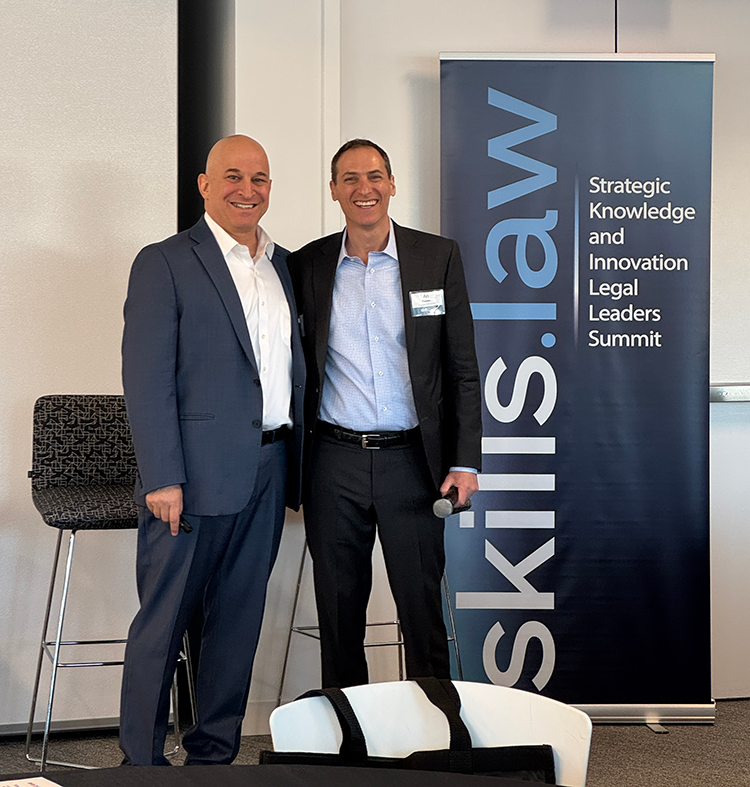The Summit provided a roadmap based on research for law firms interested in implementing generative AI
The SKILLS survey, conducted in the first quarter 2025, interviewed 100 professionals about their use of artificial intelligence applications. The majority of the research respondents were from large law firms. However, firms of all sizes with a focus on innovation were encouraged to take part. The majority of the respondents (70) were from the United States. Nine came from the United Kingdom and eight from Canada. Thirteen international law firms were represented, with headquarters mainly in New York and London. The survey was required to attend SKILLS.
Large firms are deploying AI generative
The study identified 22 use cases, and 180 solutions. The average number of generative AI solutions in use by law firm leaders who responded was 18; six are in a trial phase, and 22 are under consideration. The most common use-cases included contract drafting and time entry, due diligence, and legal research. Effective change management requires consistent communication throughout the organization. Second, innovation leaders that report directly to a senior executive, such as the managing partner, can have a greater influence on implementing change. Third, cross-functional leadership can enhance a team’s value for specific projects.
Nearly all SKILLS law firms have AI use policies
Nearly all law firms that responded (99%) have an AI use policy. Fewer firms have created an AI taskforce (87%) or developed an AI strategy (92%). These results show how important law firm leaders find tactical AI guidance, deployment protocols and collaborative talent. Companies may struggle to gain internal stakeholders’ and clients’ trust without policies, strategies, and skilled teams. This is particularly important as many legal professionals still fear and remain unfamiliar with several AI applications used by the respondents.
Developing an AI roadmap requires leadership and a framework
During the discussion, attendees recommended that policies governing the use of artificial intelligence include provisions for ethics, restrictions on firm-approved products, the significance of human involvement and a framework for risk assessment. Companies should also enhance their efforts by collaborating with external providers to supplement limited in-house resources.
While the adoption of generative AI at some firms is strong and sustained, the audience agreed that no clear demographic patterns exist. One attendee noted that the more senior a professional is, the greater value they can derive from using an AI platform by asking “smarter questions,” given their depth of knowledge and ability to add substance to a prompt.
Innovation teams are adapting to the shift from tools to transformation
Unsurprisingly, the innovation teams at the responding law firms hold primary responsibility for implementing the firms’ AI strategies (59%), closely followed by knowledge management (44%) and IT (43%), both of which share a similar level of oversight.
While the innovation team’s involvement has remained stable over the past year (59% in 2025 compared to 62% in 2024), knowledge management (44% in 2025 compared to 63% in 2024) and IT (43% in 2025 compared to 74% in 2024) have seen changes. Additionally, a quarter of respondents in 2024 indicated that other departments provided input, and 15% relied on external support for their AI initiatives.
Specific law firm trends have influenced which teams are responsible for certain actions. Law firm leaders have shifted their focus from technology to transformation when discussing the deployment of artificial intelligent. In 2025, the focus will be less on technology than on redefining a law firm’s strategy to maximize the value of information. The innovation, IT, and knowledge management teams are working together to navigate AI’s transformative impact for the firm. The rapid pace of AI and the insatiable need for its availability require a cross-functional, interdisciplinary team that will drive the firm forward. A designated ambassador will coordinate its proliferation. That diplomat is the head of innovation at many firms, whose responsibilities are broader and deeper than in 2024, yet the diplomatic corps remains multifaceted.
In particular, the role of IT teams in law firms has become significantly more prominent since the pandemic. With budgets increasing, cybersecurity is becoming more important, and growth is closely linked to technology. This position emphasizes holistic operational excellence rather than merely digital transformation.
Another important trend to note is the expansion of knowledge management to include innovation, legal operations and artificial intelligence. Law firms are increasingly promoting KM leaders to a broader innovation role or assigning responsibilities for innovation. While only 35% of respondents work at firms that have appointed a “Chief Artificial Intelligence Officer” or created a similar leadership position, this will likely change and influence who addresses or navigates these challenges.
While the data indicates that innovation teams are becoming the primary AI stakeholders, the ownership structure remains more nuanced due to overlapping talent and experience. The term “innovation” is also used more often in professional titles.
The majority have deployed generative AI
More that two-thirds (73%) of participants have implemented an internal generative AI–either created an AI chatbot or deployed one via a secure API. Sixteen percent of participants reported that they had built or commissioned an internal language model. Nearly a quarter (24%) of respondents have created products that are client-facing or revenue generating using generative AI. This is rare, but it’s not unheard of. This trend appears to mirror the actions of law firms several years ago, which initially developed mobile apps for internal use and later began offering more comprehensive versions to clients.
One participant suggested creating a fully accessible library for generative AI prompts and project-specific recommendations, akin to Netflix for queries.
OpenAI’s GPT is the leading LLM in law firms, but the generative AI support market is fragmented
Among the 73% of respondents who have implemented a generative AI solution, about three-quarters (76%) use OpenAI’s GPT as their foundational LLM model. Anthropic’s Claude is ranked second with 19% and Google’s Gemini is ranked third with 15%. A third (33%) said they used an external provider to build their language model. However, the market is still fragmented. About 15 AI partners were mentioned by respondents. Although consolidation is expected, the current demand will likely drive short-term growth rather than contraction in the provider market.
Encouraging the adoption of generative AI remains challenging
While 73% of respondents indicated that their firms utilize a legal AI assistant or chatbot, 62% have adopted the application across the entire firm or a substantial subset for testing purposes.
Adoption rates have remained low, with only 22% reporting a 50% to 100% adoption rate. This low adoption rate is one of the reasons certain teams have stopped using certain tools. As the market grows and the barriers to entry diminish due to advancements in robust AI models, competition will continue intensify. As the market grows and the barriers to entry diminish due to advancements in robust AI models, competition will continue to intensify.
To ensure success, the attendees agreed that law firms should begin their initiatives with individuals who are willing and passionate, especially since adoption is rising within the existing user base rather than from a surge in new participants in any given project.
Additionally, when evaluating technology and processes, exploring markets beyond the United States, especially in Europe, can be advantageous for generating fresh ideas and acquiring a thorough understanding of the evolving legal industry.
In some firms, discussions about generative AI use cases are reigniting interest in document automation. It is undergoing a renaissance as it could provide a more cost-effective and effective solution to the challenges some professionals expect generative AI will address. Data extraction, summarization and legal drafting were also significant applications. In contrast, the least cited applications were patent and IP drafting, litigation management, automation of discovery responses, pitches and proposals, and compliance.
When considering a new application, “try to avoid signing a long-term agreement,” advised an audience member, who added, “Price renewals are also absurd, and a similar tool is often available at half the cost with better functionality.” A peer offered, “Applications without a unique value proposition, i.e., a moat protecting their competitive advantage, may not be worth a long-term investment.” Finally, one participant cautioned, “Don’t try to learn everything because the technology will continue to evolve and only get faster.”
Ari Kaplan is a lawyer and legal industry analyst who publishes benchmarking reports on legal technology trends and is an experienced webinar and conference facilitator.






